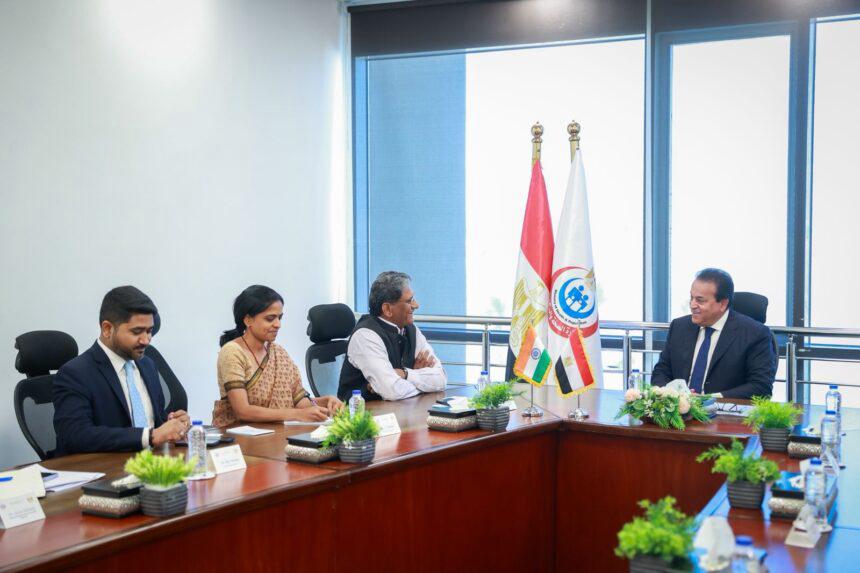 Image Source: Daily News Egypt
Image Source: Daily News Egypt
Egypt and India are strengthening their bilateral strategic partnership with a focus on healthcare collaboration, pharmaceutical innovation, and vaccine manufacturing. Recent high-level engagements, including discussions between Egypt’s Deputy Prime Minister and Health Minister Khaled Abdel Ghaffar and Indian Ambassador to Cairo Suresh K. Reddy, have underscored shared vision and actionable plans to enhance cooperation in medical technologies and healthcare accessibility across regions.
Key Highlights: Expanding Healthcare Cooperation
Talks emphasized boosting universal health coverage and advancing digital healthcare platforms, echoing both nations’ commitment to improving public health infrastructure.
Partnering in cutting-edge initiatives like robotic surgeries and smart primary care models was discussed, leveraging Indian institutions such as Apollo Hospitals and Aster DM Healthcare to transfer expertise to Egyptian facilities.
Egypt’s position as a gateway to African markets makes it a strategic hub for health and pharmaceutical expansion, a fact acknowledged by Indian counterparts aiming to deepen regional collaboration and investment.
Joint Pharmaceutical and Vaccine Projects
The countries are exploring joint ventures to expand local production of medicines and vaccines, aligning with the African Union’s goal to enhance healthcare self-reliance on the continent.
Egypt’s expanded vaccine manufacturing capabilities, led by companies like VACSERA, already collaborate with India’s Serum Institute, paving the path for increased partnerships.
Indian pharmaceutical companies are invited to invest in Egyptian facilities and attend forthcoming global health events like the World Conference on Population and Development in November 2025 to foster stronger ties.
Technological Innovations and Digital Health
Digital transformation in healthcare is a priority, exemplified by collaborations such as Reliance-backed KareXpert partnering with Telecom Egypt to launch national digital health platforms.
These platforms integrate hospital information management, electronic medical records, and streamline billing and revenue cycles, improving operational efficiency while maintaining data privacy and regulatory compliance.
Both nations seek to leverage artificial intelligence, Internet of Things (IoT), and cloud technologies to modernize healthcare delivery and expand quality access.
Political Will and High-Level Engagements
Strong political leadership from both sides has created a conducive climate for ongoing and new healthcare initiatives, with multiple ministerial and parliamentary delegations exchanged in 2025.
Frequent high-level dialogues reflect a mature partnership aiming to deliver sustainable impact in healthcare outcomes and regional development.
The strategic partnership signed in 2023 between Indian Prime Minister Narendra Modi and Egyptian President Abdel Fattah El Sisi continues to drive forward momentum in bilateral cooperation.
Broader Economic and Social Impact
Healthcare collaboration forms a critical component of India-Egypt relations, complementing engagements in trade, technology, agriculture, and education.
Initiatives in health innovation contribute significantly toward achieving Sustainable Development Goals, enhancing resilience against pandemics, and addressing demographic health challenges.
India’s growing economy and Egypt’s Vision 2030 economic transformation plan align well to create opportunities for co-development and shared prosperity.
Conclusion: Towards a Future-Forward Healthcare Alliance
The evolving India-Egypt partnership in healthcare and vaccine manufacturing signifies a forward-looking alliance grounded in shared challenges and complementary strengths. By combining India’s pharmaceutical prowess and digital health expertise with Egypt’s strategic geographic and economic positioning in Africa, both countries aim to build a robust healthcare ecosystem benefitting millions. This collaborative journey fosters innovation, strengthens regional health security, and charts a path for sustainable, inclusive growth in the 21st century.
Sources: SIS Egypt, Daily News Egypt, Zawya
Advertisement
Advertisement




